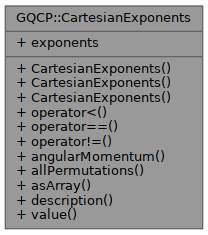#include <CartesianExponents.hpp>
Collaboration diagram for GQCP::CartesianExponents:

Public Member Functions | |
| CartesianExponents (const std::array< size_t, 3 > &array) | |
| CartesianExponents (const size_t x, const size_t y, const size_t z) | |
| CartesianExponents (const std::vector< size_t > &vector) | |
| bool | operator< (const CartesianExponents &rhs) const |
| bool | operator== (const CartesianExponents &rhs) const |
| bool | operator!= (const CartesianExponents &rhs) const |
| size_t | angularMomentum () const |
| std::vector< CartesianExponents > | allPermutations () const |
| const std::array< size_t, 3 > & | asArray () const |
| std::string | description () const |
| size_t | value (const CartesianDirection direction) const |
Public Attributes | |
| std::array< size_t, 3 > | exponents |
Detailed Description
A class that represents exponents of the Cartesian functions x, y and z
Constructor & Destructor Documentation
◆ CartesianExponents() [1/3]
| GQCP::CartesianExponents::CartesianExponents | ( | const std::array< size_t, 3 > & | array | ) |
- Parameters
-
array the array containing the x-, y- and z-exponent (in that order)
◆ CartesianExponents() [2/3]
| GQCP::CartesianExponents::CartesianExponents | ( | const size_t | x, |
| const size_t | y, | ||
| const size_t | z | ||
| ) |
- Parameters
-
x the exponent in x y the exponent in y z the exponent in z
◆ CartesianExponents() [3/3]
| GQCP::CartesianExponents::CartesianExponents | ( | const std::vector< size_t > & | vector | ) |
- Parameters
-
vector the vector containing the x-, y- and z-exponent (in that order)
Member Function Documentation
◆ allPermutations()
| std::vector< CartesianExponents > GQCP::CartesianExponents::allPermutations | ( | ) | const |
- Returns
- a sorted list of all permutations (i.e. switching x, y, z) of these Cartesian exponents
◆ angularMomentum()
| size_t GQCP::CartesianExponents::angularMomentum | ( | ) | const |
- Returns
- the angular momentum corresponding to these exponents
◆ asArray()
|
inline |
- Returns
- the exponents as an array
◆ description()
| std::string GQCP::CartesianExponents::description | ( | ) | const |
- Returns
- a textual description of self
◆ operator!=()
| bool GQCP::CartesianExponents::operator!= | ( | const CartesianExponents & | rhs | ) | const |
- Parameters
-
rhs the right-hand side of the operator ==
- Returns
- if the Cartesian exponents are considered different
◆ operator<()
| bool GQCP::CartesianExponents::operator< | ( | const CartesianExponents & | rhs | ) | const |
- Parameters
-
rhs the right-hand side of the operator <
- Returns
- if these Cartesian exponents are 'smaller' than the ones on the right-hand side. The following logic is used: lhs < rhs
- if lhs's angular momentum is smaller
- if both angular momenta are equal, x takes precedence over y, over z
This means that {1, 0, 0}(=x) < {2, 0, 0}(=x^2), and {2, 0, 0}(=x^2) < {1, 1, 0}(=xy)
◆ operator==()
| bool GQCP::CartesianExponents::operator== | ( | const CartesianExponents & | rhs | ) | const |
- Parameters
-
rhs the right-hand side of the operator ==
- Returns
- if the Cartesian exponents are considered equal
◆ value()
|
inline |
- Parameters
-
direction the direction (x,y,z) whose exponent should be returned
- Returns
- the exponent in the given direction
Member Data Documentation
◆ exponents
| std::array<size_t, 3> GQCP::CartesianExponents::exponents |
The documentation for this struct was generated from the following files:
- /__w/GQCP/GQCP/gqcp/include/Mathematical/Functions/CartesianExponents.hpp
- /__w/GQCP/GQCP/gqcp/src/Mathematical/Functions/CartesianExponents.cpp